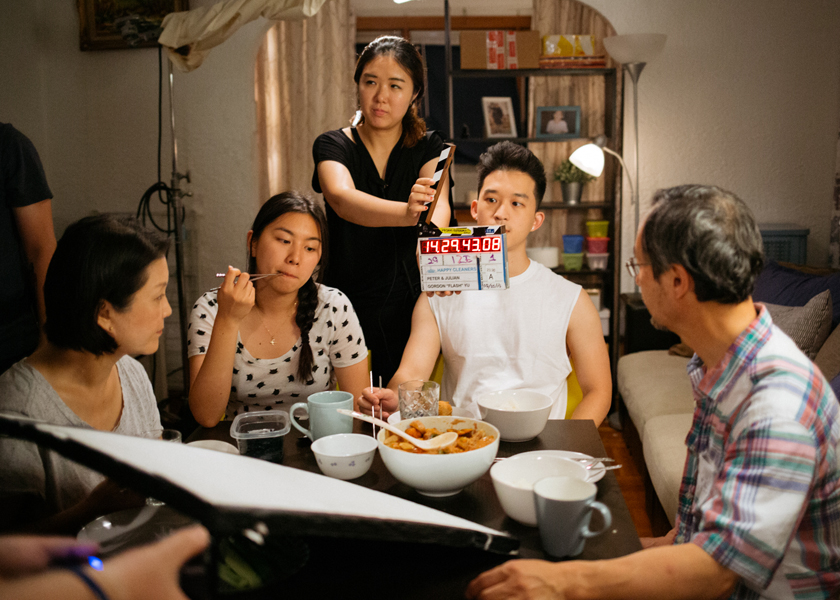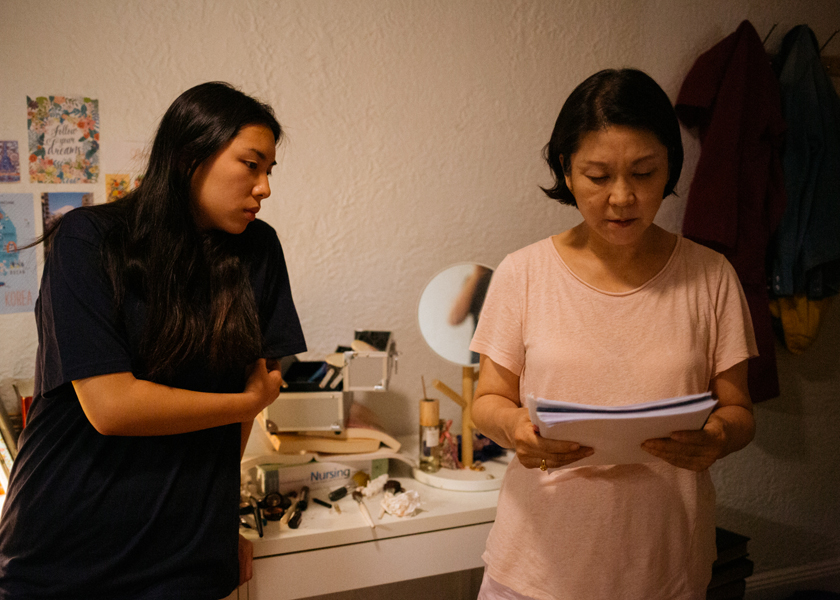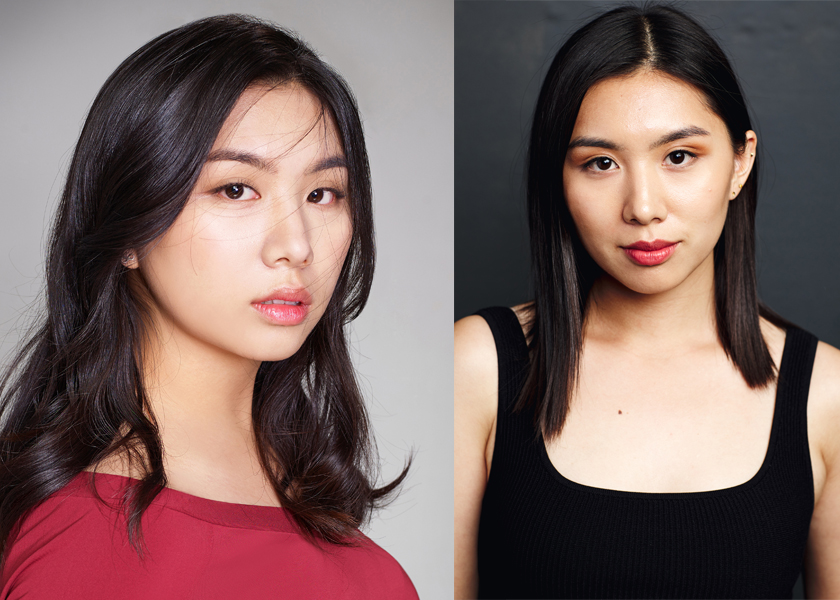Yenna Sung of Happy Cleaners finds her way as a Korean American actor in New York | By Song-Un Lee (Spring 2021 issue)

Actor Yeena Sung plays the optimistic, dutiful older sister Hyunny in Happy Cleaners (see KQ review) directed by Julian Kim and Peter S. Lee. It’s a film about a Korean American family running a struggling dry-cleaning business in Flushing, a neighborhood in Queens, New York.
The pioneering film tackles the Korean American immigrant experience with authenticity and sometimes brutal honesty. Hyunny is a nurse who is able to support her parents financially during their tough times and acts as an unofficial mediator between her parents and her rebellious younger brother.
In one heartbreaking scene, Hyunny and her mother come to blows when the mother disapproves of Hyunny’s boyfriend, who is also struggling to get his life going. Hyunny’s role as the peacemaker breaks down as she fires back at her mother for overburdening her with so much negativity and the father watches helplessly from the sidelines as his family is seemingly falling apart.
Sung describes her approach to this scene. “She’s told what to do and she keeps following through. She doesn’t rebel like her brother does. She’s annoyed but she says OK to things. And there are so many times when she decides to help her parents out. But to what extent?” she said. “In Hyunny’s eyes, her mom doesn’t know when to stop.”

Hyunny is a person who keeps going, making intentional choices. “Something that I really admired about Hyunny is that she always chooses to be optimistic,” Sung said. “I don’t think she just has an optimistic energy. I think it’s a choice and that’s so admirable. She just keeps moving forward, despite anything that gets in her way.”
Although she does not want to be like her mother, Hyunny shares a lot of characteristics with her. “I see so much of the mother in the daughter. She’s probably going to turn into the mother she sometimes despises. You can feel that. Especially when Hyunny talks to her boyfriend. She suddenly turns into her mom. I just had so much fun playing her.”
In real life, Sung is the younger of two sisters. Her older sister is a doctor in Korea. “I’m a dutiful daughter but not to the extent of Hyunny. I remember growing up, I would see my sister and how she would try to listen to my parents more than I do and I remember thinking, ‘Oh, I don’t want to be that.’ And that’s when it clicked, Oh I’m not Hyunny! But I see a lot of similarities and differences between me and Hyunny.”
Another difference between Hyunny and Sung is that Sung has not lived a typical Korean American experience. She identifies herself as being “in between Korean and Korean American.”
Sung was born and raised in Korea, and has always loved acting and singing. Her conviction began early as a toddler. “At the age of five or something I thought singers are not as serious and I’m going to be an actor because I wanted to be serious,” she said, laughing. Sung wasn’t shy as a girl, and loved to be the center of attention.
Her first exposure to the U.S. occurred during her second and third grade years. She spent two years in the small town of Belmont, Massachusetts. As the only Asian kid in the school, unable to speak the language, she felt simultaneously a center of attention and invisible. Others generally ignored her. “That was such a traumatic and shocking experience. When I was in Korea, I was very bright and energetic, so I never had to struggle and think about fitting in.”
During her difficult two years, she still held onto her passion. After-school activities, like stage plays, were a source of motivation. “They were acting classes, or more like, ‘Here’s a short play. You’re a princess.’ I remember I hated being me during that time. Just having some kind of character or story to hide myself in saved me.”
Having any role was a big deal during that difficult time. “There was this school play and I had no lines,” she recalled. “I had to bring up a paper that showed the words “SCENE ONE” and walk off stage. “ACT TWO” then go off stage. And I remember even that role, I went into it with this feeling of, ‘Ok this is my moment to shine!’”
Sung returned to Korea after third grade and was hoping to get back to normal school life. However, after two years away, she had already become a foreigner in the eyes of her Korean classmates. She felt like an outsider, and even in fourth grade, she felt a sense of alienation. She acknowledges, “There was something that happened to my psyche during that time.”
Sung continued to dream of being an actor. The feeling of not belonging persisted, and she realized she had to choose where she belonged: Korea or the U.S. She had a “feeling of America being stronger. If I can’t belong anywhere, I’m going to go to America. I’m going to succeed as an actor in America.”
Once Sung made up her mind, she began to cultivate in herself an American identity. She didn’t listen to K-pop and only listened to American music. She bided her time until ninth grade when she was ready to make the big leap.
In ninth grade, she auditioned and got accepted to an arts school in Massachusetts. She was eager to start her Fame experience, she said, referring to the 1980 Alan Parker film Fame, which became a popular TV series, about the celebrations and struggles of students at a New York City performance arts school.
Yet when she arrived at the school, her Fame fantasy collided with the reality of her American arts high school experience. By this point, her passion for the arts had hardened her into an angry young teenager. From her perspective, her classmates were just having fun and not taking things too seriously, while for her, this was a life-changing, breakthrough moment. There was sacrifice and purpose involved in travelling so far, and trying to shed her Korean identity in her determination to be an American artist.
Ironically, this angry determination made her realize she couldn’t escape her identity. She felt more Korean than ever. Her resentment towards her classmates created a barrier. “‘Do you know how much I had to sacrifice to get here?’ I was in that kind of state.” Disillusioned, she eventually transferred to an arts school in Korea which was much less exciting than the Fame school of her imagination.
Her parents at this point were wondering about her career options, and if acting could be a hobby instead of a career path. But Sung was determined that acting was her calling. The determination let her to New York University’s Tisch School of the Arts, where she earned a fine arts degree in acting, followed by a Master’s of Fine Arts at Columbia School of the Arts. She is currently represented by Brillstein Entertainment Partners and A3 Artists Agency.

Living in New York City has allowed her the opportunity to act in Happy Cleaners, and to appear in the upcoming Darren Star’s TV series Younger. The thriving New York City theater community has allowed her to enjoy creative fulfillment, at least in the pre-COVID era. Sung loves the diversity and the bold risk-taking spirit of the theater scene in New York and can’t wait for live theater to return after the pandemic.
Before COVID-19 shut down New York City theaters, Sung performed in several off-Broadway productions. One of her favorite roles is that of Viola in the Classical Theatre of Harlem’s production of Shakespeare’s comedy, Twelfth Night. Sung had great fun playing the complicated character who disguises herself as her brother after learning about his death in a shipwreck while she successfully finds work as a servant within the court society.
“It was just so fun. Twelfth Night just happens to be a play that has a lot of musical elements in it and those are my favorite kind of plays.” In addition to acting, Yeena is also a singer (soprano), pianist and loves composing music. Her favorite actor is Robin Williams, who also had a famous gender-bending role in the comedy-drama film Mrs. Doubtfire.
Sung remarked that the two stories share more similarities; both are comedies on the surface, with elements of drama and sadness underneath. In Twelfth Night, she said, in any scene “even if it was more romantic or more serious, there was always elements of comedy in the way we created the story. For my character; she’s going through so much. The death of her brother and the trauma of having to [become] her dead brother. It’s such an interesting balance you have to play.”
Another theatre project she loved being a part of was a production titled, Hi-Fi, Wi-Fi, Sci-Fi, at the LaMaMa Theater. According to Yeena, LaMaMa Theater “is the most renowned off-off Broadway theatre venue. It’s the only off-off Broadway venue that started the movement and is still operating,” she said. “It’s a pretty cool theatre place to be.”
True to the downtown spirit of the off-off Broadway setting, the theater production was very unconventional. The first act takes place in the lobby where the audience and actors are standing in close proximity. Subsequent scenes require actors to perform in front of cameras as their live performances are projected onto white walls for the audience. “Audience members would be right here. They were so close,” she said. “They give off so much energy. I miss that a lot.”
Sung continues to negotiate the challenge of being an Asian American actor. She wants to continue to be a part of the Asian American narratives such as Happy Cleaners, but does not want to limit her opportunities either. She understands her Asian American identity will always be a part of her performance.
“I go for roles that are all ethnicities or Korean. That has been my experience. I’m fortunate to have an agent and a manager who, if the role calls for all ethnicity, they’ll put me in it. And the thing is, people are not color blind. Even if it was not written for an Asian American role specifically, since I am playing it, they will project all kind of things into my character that I can’t control.”
She recalls the advice of a professor when she played Hamlet, as she tried to fit her performance to ideas of previous Hamlet actors, mostly white men. Sung remembers the teacher’s advice, that “‘the reason why this character is so unique is because you are playing it. Not somebody else.’ I think this is true. So, I see how it can be limiting to be called an Asian American actor but, also, it’s a part of you.”
In addition to acting, Sung also aspires to expand her role as an artist by producing films, as she did with two small indie films some years ago. “Bring people in that I’d like to work with, writing stories that I know, that I don’t see in the media. Also star in it. Yeah, that would be super cool.”
Currently Sung is producing and composing the music for a theater production with a fellow graduate from Columbia who is a dancer. The theme of the piece is the cyclical growth and setbacks of life. Improvisational dancing will combine with text and music for a holistic theatre experience. The co-producers are discussing how to stage the piece with two different theater companies. Whether it will be live theater or live streamed will depend on how many theaters will open in the near future, she said.
When asked what advice she would give to young aspiring actors and artists, Sung said she recommends to be kind to yourself and have a strong sense of who you are. Even as she is sharing her experience and counsel, it’s hard not to imagine she is also reminding herself of these encouragements as well.
“I think I would tell them you know yourself best,” she said. “As performers, you’re bound to hear so many different things from other people. I’m not saying don’t receive it. But at the end of the day, you know yourself best.”
Actors in particular may be too willing to change in order to please a director, Sung observed. “You can change your performance, but being really confident about who you are, knowing that nobody can take that away from you, I think, is really important to know when you’re starting out.” When she works with “a very intense director who talks to me in a way I would perceive to be condescending,” she said, she can still receive the information. However, she strives to “translate whatever that is to something that is healthy for me, that makes sense to me, so that I can deliver a good performance.”
COVID has taken a toll on the huge theater community of New York. Sung said she has seen all kinds of creative solutions to social distancing, like Zoom theater, and shooting theater for a screen. It has been a strange time for live theater and live events of all kinds. However, Sung is eager to get back to being a part of the theater community and understands the life of an actor/artist is not an easy one. There will be dry spells and times of harvest. But she will continue to follow her passion.
“Oh yeah, I love acting! It’s interesting. Everything that I love, I stress out so much about. But that’s when I know that I love it,” she said. “Because when I love something so much, it’s not that I want to do it right, I really want to serve the story. Serve my character, to my fullest ability. Yeah, it’s such a fun process. It can be stressful but very, very fun.”


